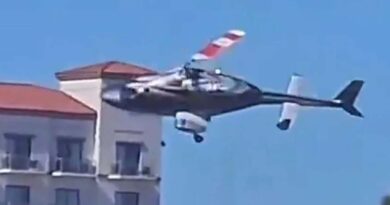GPS jamming on von der Leyen’s plane the latest sign of Russia’s hybrid warfare
LONDON — The Kremlin’s campaign of hybrid warfare has jammed its way to the top of Europe’s agenda.
A plane carrying the continent’s top official lost its GPS navigation while midair over the continent’s wary east over the weekend and was forced to land using paper maps. This was the most high-profile case yet, officials and experts said Tuesday, of a Russian strategy that is not only disrupting travel but imperiling lives.
European Commission President Ursula von der Leyen’s flight landed safely in Bulgaria, just a short distance from Russian territory. But it has given a jolt to European fears over Moscow’s suspected interference with Western signals.
Once a background nuisance, the issue has surged into a mounting security concern — escalating in step with Moscow’s war in Ukraine — and has the continent scrambling to adapt.
NATO ‘working day and night’
Bulgarian authorities later confirmed that the satellite signal guiding the plane’s navigation system had been neutralized. The European Commission said Bulgaria suspected “blatant interference by Russia.”
The Kremlin has not responded publicly, but spokesperson Dmitry Peskov told the Financial Times, which originally reported the story, that its information was “incorrect.”
NATO takes the jamming of GPS signals “very seriously” and is “working day and night to counter this, to prevent it, and to make sure that they will not do it again,” Secretary-General Mark Rutte said Tuesday.
He framed the signal interference as part of a much broader campaign spanning the cutting of undersea cables in the Baltic Sea and a cyberattack on Britain’s National Health Service.
The threat from Russia was “increasing every day,” he said.
The disruption of von der Leyen’s plane has thrust the issue into the spotlight at a time when Europe is already on edge over the war in Ukraine and its spillover effects.
While pilots and ship captains expected occasional outages near Russia’s borders or conflict zones, incidents have surged in recent years.
The Bulgarian Air Traffic Services Authority said there had been a “noticeable increase” in GPS incidents, including jamming, since Russia launched its full-scale invasion of Ukraine in February 2022.

In June, 13 European Union member states raised the alarm over jamming and spoofing threats disrupting air and sea travel.
According to an E.U. document, Poland logged 2,732 cases of interference in January 2025, up from 1,908 in late 2023. Lithuania recorded 1,185 cases in the same month, more than double the figure from March 2024.
The document describes interference as “not random incidents but a systemic, deliberate action by Russia and Belarus.”
Germany’s top military commander, Gen. Carsten Breuer, said Monday there had been a significant increase in GPS jamming incidents since the war in Ukraine began, adding that he had personally experienced it on two occasions, once over the Baltic Sea and again during a military exercise in Lithuania.
Estonia, Lithuania, Latvia, Sweden and Germany have formally declared such interference a form of Russian hybrid warfare.
A ‘happy propaganda coup’?
Open-source research tracing the origins of interference repeatedly points to two hot spots: Russia’s Kaliningrad exclave, wedged between Poland and Lithuania, and the St. Petersburg area in western Russia. Both regions host a heavy concentration of Russian military units specializing in electronic warfare.
In March 2024, a Royal Air Force plane carrying the U.K.’s then–defense secretary, Grant Shapps, also reported a spoofing incident, where false location data was fed to the aircraft’s navigation systems.
The plane, which had been flying near Kaliningrad, was able to continue its journey safely, but such tactics have in the past caused planes to veer off course.
The incident with von der Leyen’s plane occurred while she was on a four-day tour of E.U. member states that border Russia, Belarus or the Black Sea.

While “incredibly irresponsible,” jamming von der Leyen’s plane wasn’t necessarily a “malicious action” directed against her specifically, said Thomas Withington, an electronic warfare and air defense expert at the Royal United Services Institute, a think tank in London.
“I think on this occasion, Ms. von der Leyen’s aircraft was just unlucky,” he told NBC News, adding that Russia generally transmits jamming signals with the intention of disrupting satellite-guided weapons or drones.
“I think the fact that her aircraft was jammed is probably a sort of happy propaganda coup for Mr. Putin and his government,” he said.
As disruption increases, the West has stepped up countermeasures.
The E.U. outlined plans Monday to deploy additional satellites into low Earth orbit to strengthen its ability to detect interference.
Together with Poland, Sweden and Denmark, a land-based positioning system is being set up around the Baltic Sea.
Poland has also set up coastal monitoring stations to trace interference in real time, while Italy has announced plans to tighten security on state flights, including classifying flight data and restricting access to tracking and flight plans.
Some airlines are updating procedures to prepare crews for extended outages.
Eric Schouten, an intelligence analyst and CEO of Dyami Security Intelligence, said the incident was not a “major escalation,” explaining that pilots were now trained using backup systems and how to identify spoofing and jamming.
Instead, Russia was disrupting GPS systems to “test NATO’s response,” he said.
“NATO is using a lot of GPS tooling and equipment to fly, to guide the bombs,” he said, adding that such interference can also affect mobile devices and services such as Google Maps.
“In Poland or the Baltics or in Sweden, relying on GPS in your car, in your navigation system, it’s not always the smartest thing to do,” he said.
“It is a perfect tactic to let the enemy know that you are in control of things that they use on a daily basis.”
Freddie Clayton reported from London, and Andy Eckardt from Mainz, Germany.





